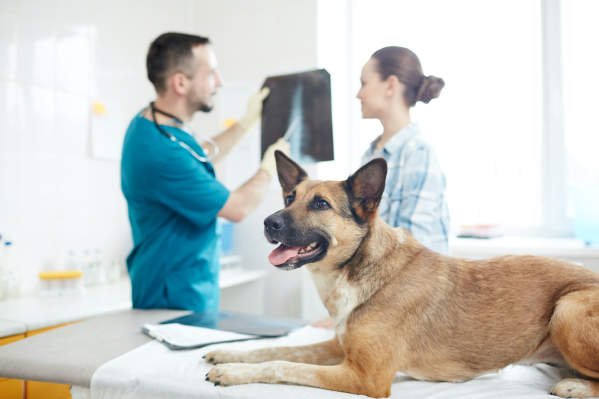Dogs are a complex species. Each breed vastly differs from one another — not just in appearance, but also in their personalities and requirements for care. Even within the same breed — often within the same litter — you'll find that no two dogs are exactly alike. That can lead you to have a lot of questions about caring for your dog. Here are some of the most frequently asked questions vets get — and common responses. We spoke with Jennifer Pearl, DVM, assistant medical director at Animal Medical Center of Mid-America of St. Louis, Missouri which questions she gets the most from pup parents. Here’s what she had to say.
1. What’s the best dog food?
The best food for your dog is going to depend on your dog's age, activity level, and any food allergies they may have.
"Because not every dog or puppy has the same nutritional needs, it’s best to consult your veterinarian when trying to choose your dog’s diet,” says Dr. Pearl. “Your vet can provide options that address your dog’s stage of development, activity level, body condition, and health concerns."
Of course, there are many brands to choose from, so there are probably plenty that your veterinarian doesn't even know about.
That's why you should always read dog food labels. Focus on whole-food ingredients and avoid dog food ingredients that include by-products, fillers, chemicals, artificial preservatives, food dyes, and other processed ingredients.
2. What shots does my dog need?
Should you get your dog vaccinated? The answer is yes, but which vaccines your dog needs depends on their age and lifestyle:
Vaccination Rules for Puppies
"Puppies need a series of vaccinations to prevent several common, contagious diseases like distemper, hepatitis, parvovirus, and parainfluenza. They also need a rabies vaccination by the time they reach 16 weeks old," explains Pearl.
A young puppy's immune system needs vaccinations to protect against illness while they’re growing and developing, when they’re especially susceptible to certain illnesses and diseases. Missing any vaccinations (or their due dates) can put your growing puppy at risk of serious health complications.
A young puppy's immune system needs vaccinations to protect against illness while they’re growing and developing, when they’re especially susceptible to certain illnesses and diseases.
Think about it: Your puppy is young and bright-eyed. They spend a great deal of time rummaging about, exploring new territory, and probably getting into things they shouldn't. We also tend to bring our puppies with us everywhere we go and introduce them to other people and their pets. These activities put your dog at a higher risk of exposure to infection, so keeping up to date with your pup’s vaccination schedule is key.
Adult Dogs Need Vaccinations, Too
"Adult dogs need to stay up-to-date with their rabies vaccination,” says Pearl, which is usually administered every year.
"Depending on your dog’s lifestyle, your veterinarian may recommend additional routine vaccinations," adds Pearl, like canine influenza, Leptospirosis, or Lyme disease.
Your city, county, or state may also require certain vaccinations by law. So be sure to check with your veterinarian at every check-up to make sure your dog is up-to-date with all required vaccinations.
3. Does my dog need heartworm preventative year-round?
"Heartworm disease exists in all 50 states, and contrary to what some believe, it can affect your dog any time of year," says Pearl.
Many dog owners believe that heartworm disease is only prevalent during the summer months, as the mosquitoes that transmit the disease are associated with warmer weather. However, "Mosquitos can live and reproduce in the colder months as well as the warmer months," says Pearl.
Any place frequented by other dogs or wildlife (like foxes and coyotes) likely exposes your dogs to these parasites — including the dog park and even your own backyard.
So you shouldn’t take heartworm prevention lightly. "Left untreated, heartworm disease can be deadly for dogs and puppies," says Pearl. "Year-round prevention is less expensive and less painful for your dog than treating the disease.”
"Left untreated, heartworm disease can be deadly for dogs and puppies. Year-round prevention is less expensive and less painful for your dog than treating the disease," says Dr. Pearl.
Don’t Forget Flea and Tick Treatment, Too
While you're at it, keep your dog up to date with flea and tick prevention to help avoid a wide range of health issues, from skin infections to Lyme disease. Similarly to heartworm, most veterinarians recommend year-round preventative flea and tick medications. There are plenty of available options, including topicals, orals, and even as collars your dog can wear.
Have More Questions?
Don’t be afraid to ask your vet. They'll be able to address your specific situation and your dog's needs to prevent illness and keep your dog healthy.
